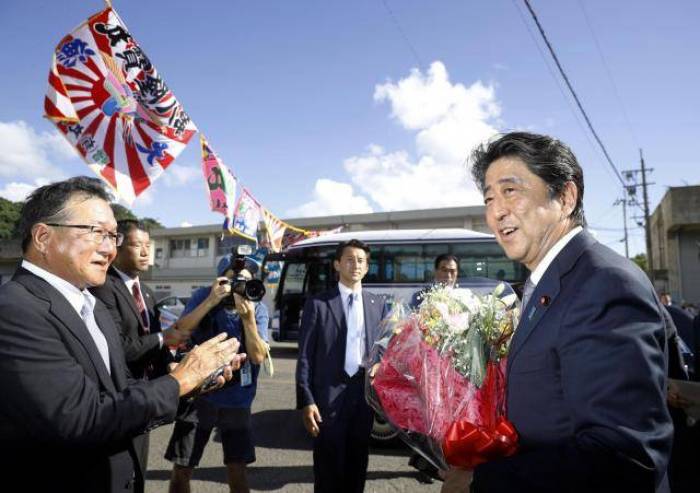The expected victory over ex-defense minister Shigeru Ishiba in the Sept. 20 Liberal Democratic Party (LDP) poll would put Abe on track to become Japan’s longest-serving premier. The winner becomes prime minister due to the LDP-led coalition’s grip on parliament.
“It is my responsibility to respond to the mandate of the people,” Abe told reporters during a trip to southwestern Japan. “I am resolved to steer Japan for another three years as LDP president and prime minister.”
Analysts say Abe looks set hold on to the top job because his nearly six years in power have enabled him to woo LDP backers with cabinet posts and other favors and to shut out rivals, while a weak opposition makes his lukewarm popularity among the electorate less relevant.
Abe began a second stint as prime minister in 2012 promising to reboot the deflation-plagued economy with his “Abenomics” policies and to bolster defense.
He has boosted defense spending and loosened constitutional limits on the military but, on the economic side, the Bank of Japan has failed to reach its 2 percent inflation target despite an ultra-loose policy.
What Abe will pursue if he wins the vote and extends his tenure as prime minister is far from clear.
“What is the economic agenda? The answer is stability - don’t rock the boat,” said Jesper Koll, head of equities fund WisdomTree Japan.
On the security front, Abe wants to revise the post-war constitution’s pacifist Article 9 to clarify the ambiguous status of Japan’s military. The article, if taken literally, bans maintenance of armed forces but it has been interpreted to allow a military for self-defense.
CONSTITUTION CHANGE RISKY
Whether he will make the attempt is in doubt, since the proposal is controversial and the process is politically risky. Amendments need approval by two-thirds of both houses of parliament and a majority in a referendum.
“The only concrete item on his agenda I can see is constitutional revision, and that is unlikely to fly,” said Columbia University emeritus professor Gerry Curtis.
Abe is not wildly popular, although his ratings have recovered from lows of about 30 percent earlier this year amid accusations of cronyism scandals. He has denied wrongdoing.
An Asahi News Network (ANN) survey published last week put his support at 38.8 percent, while a Kyodo news agency poll on Sunday showed support at 44.2 percent. A Nikkei business daily survey released on Monday put support for Abe’s cabinet at 48 percent, up three points, while a poll by the conservative Yomiuri newspaper showed support of 50 percent, up five points.
Ishiba, who stresses the need to revive public trust in politics and redress economic imbalances, outranked Abe among voters asked who they’d prefer to see as premier in the ANN poll. But among LDP backers Abe led with 58 percent to Ishiba’s 31 percent.
In the Nikkei survey, 39 percent of all voters backed Abe for next premier versus 31 percent for Ishiba. The percentage picking Abe jumped to 65 percent among LDP supporters.
Media surveys suggest Abe has the support of at least 70 percent of the 405 votes in the leadership election from LDP parliamentarians. Another 405 votes will be apportioned based on the votes of rank-and-file party members.
“Abe gets people as excited as cold pizza but will win because he co-opts, sidelines and intimidates potential LDP rivals, and doesn’t have to worry about tepid public support because the opposition has imploded,” said Jeffrey Kingston, director of Asian studies at Temple University Japan campus.
The opposition Democratic Party of Japan, haunted by its rocky 2009-2012 rule, broke up last year.
Its successors, the left-of-centre Constitutional Democratic Party of Japan (CDPJ) and the centrist Democratic Party for the People (DPP), are struggling.
CDPJ support was at 5.6 percent in a survey by NHK public TV this month and that for the DPP at 0.4 percent. LDP support was 35.6 percent, with 43.2 percent backing no particular party.
More about: #Japan
















































